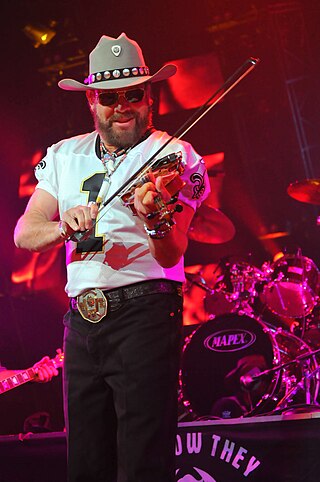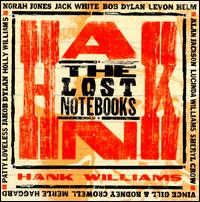Related Research Articles

HiramKing "Hank" Williams was an American singer-songwriter. He is regarded as one of the most significant and influential American singers and songwriters of the 20th century. Williams recorded 55 singles that reached the top 10 of the Billboard Country & Western Best Sellers chart, five of which were released posthumously, and 12 of which reached No.1.

Randall Hank Williams, known professionally as Hank Williams Jr. or Bocephus, is an American singer-songwriter and musician. His musical style has been described as a blend of rock, blues, and country. He is the son of country musician Hank Williams and the father of musicians Holly Williams and Hank Williams III, and the grandfather of Coleman Williams. He is also the half brother of Jett Williams.

Shelton Hank Williams, known as Hank Williams III, is an American musician, singer, songwriter and multi-instrumentalist, whose musical style ranges from country music to punk rock and heavy metal. He was the drummer of hardcore punk band Arson Anthem and bassist of Phil Anselmo's band Superjoint Ritual. He has released eleven studio albums, including five for Curb Records.
Jett Williams is an American singer and songwriter.

Holly Audrey Williams is an American singer-songwriter and musician. She is the granddaughter of Hank Williams, the niece of Jett Williams, daughter of Hank Williams Jr., half-sister of Hank Williams III, and aunt of Coleman Williams. Williams has released three studio albums: The Ones We Never Knew in 2004, Here with Me in 2009 and The Highway in 2013. The Highway was released on Williams' own label, Georgiana Records, and reached No. 146 on the Billboard 200
"Jambalaya (On the Bayou)" is a song written and recorded by American country music singer Hank Williams that was first released in July 1952. It is Williams' most recorded song. Named for a Creole and Cajun dish, jambalaya, it spawned numerous recordings and has since achieved popularity in several different music genres.
"Half as Much" is an American pop standard song written by Curley Williams in 1951. It was recorded by country music singer Hank Williams in 1952 and reached number two on the Billboard Country Singles chart.
"Cold, Cold Heart" is a country music and pop song written and first recorded by Hank Williams. This blues ballad is both a classic of honky-tonk and an entry in the Great American Songbook.
"I'm So Lonesome I Could Cry" is a song written and recorded by American country music singer-songwriter Hank Williams in 1949. The song has been covered by a wide range of musicians.

"I Saw the Light" is a country gospel song written by Hank Williams. Williams was inspired to write the song while returning from a concert by a remark his mother made while they were arriving in Montgomery, Alabama. He recorded the song during his first session for MGM Records, and released in September 1948. Williams' version did not enjoy major success during its initial release, but eventually it became one of his most popular songs and the closing number for his live shows. It was soon covered by other acts, and has become a country gospel standard.
"Ramblin' Man" is a song written in 1951 by Hank Williams. It was released as the B-side to the 1953 number one hit "Take These Chains from My Heart", as well as to the 1976 re-release of "Why Don't You Love Me". It is also included on the 40 Greatest Hits, a staple of his CD re-released material.
"Honky Tonk Blues" was a hit country and western song written and performed by Hank Williams. The original 1952 recording was a major hit, and it later became a hit for Charley Pride.

My Favorites of Hank Williams is an album by American country music artist George Jones. It was released in 1962 on the United Artists record label. It was Jones' second tribute to the music of Hank Williams.

George Jones Salutes Hank Williams is the 1960 country music studio album released in May 1960 by George Jones. The album was the ninth studio LP release, and was recorded in one session. The album has been reissued multiple times since its release, including the tracks being reused on many compilations.
"You Win Again" is a 1952 song by Hank Williams. In style, the song is a blues ballad and deals with the singer's despair with his partner. The song has been widely covered, including versions by Ray Charles, Jerry Lee Lewis, Roy Orbison, the Grateful Dead, Charley Pride, Bob Dylan, and the Rolling Stones.

"There's a Tear in My Beer" is a country song written by Hank Williams and recorded by Big Bill Lister, which was later re-recorded by his son in 1988.

Your Cheatin' Heart is a 1964 American fictionalized biographical-musical directed by Gene Nelson and starring George Hamilton as country singer Hank Williams. It co-stars Susan Oliver and Red Buttons.

The Lost Notebooks of Hank Williams is a 2011 album by folk, country, and rock artists who set music to lyrics by country musician Hank Williams. The album was released on October 4, 2011.

Hank Williams Sings is the debut album by American country music singer-songwriter Hank Williams. It was released by MGM Records on November 9, 1951.
"A Mansion on the Hill" is a song written by Hank Williams and Fred Rose and originally recorded by Williams on MGM Records. It peaked at No. 12 on the Most Played Jukebox Folk Records chart in March 1949.
References
- ↑ Escott, Colin (2004). Hank Williams: The Biography. Back Bay. p. 330. ISBN 0-316-73497-7.